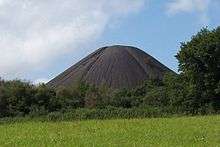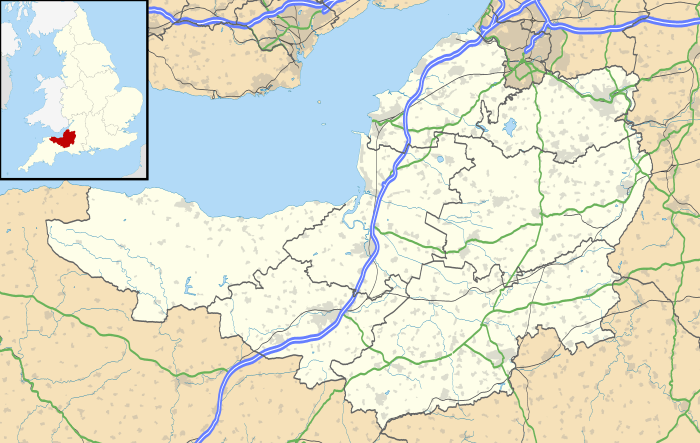Paulton
Coordinates: 51°18′25″N 2°30′10″W / 51.3069°N 2.5027°W
Paulton is a large village and civil parish, with a population of 5,302,[1] located to the north of the Mendip Hills, in the unitary authority of Bath and North East Somerset (BANES), England.
Paulton is a former coal mining village and the terminus of the Somerset Coal Canal is at Paulton basin, just north of the village. Paulton was home to the now-closed Polestar Purnells printing factory and Ashman's boot factory, where 'Voidax' safety footwear was manufactured, and in particular Motorcycle speedway boots. The area has been designated as an 'area of special architectural or historic interest, the character or appearance of which it is desirable to preserve or enhance' under section 69 of the Planning (Listed Buildings and Conservation Areas) Act 1990.[2]
Paulton has a small hospital, a library, fire station, two pre-schools (Noahs Ark Preschool and Acorn Pre-school), an infant school and junior school. The village is served by a Tesco supermarket. There are three pubs in the village: The Red Lion, The Winterfield, and The Lamb. Until the mid-1980s, there was also The Queen Victoria, but this was demolished to make way for flats, and The Somerset Inn which closed in 2011, with the adjoining paddock the subject of an unsuccessful planning application since, which would have seen it turned into a 22 home housing estate. There are also two members' clubs in the village, Paulton Rovers F.C. and Greyfield's Sports and Social club.
The centre of the village is the location for the war memorial and a small library. There is another war memorial just outside the village which commemorates the location where 23 men were killed on 17 September 1944 when the glider they were flying in crashed en route from R.A.F. Keevil to Arnhem, as part of Operation Market Garden.
History
The parish was part of the hundred of Chewton.[3]
During the reign of Edward III the lord of the manor was Sir John de Palton and his descendants.[4]
Hill House was built in around 1760 by John Hill (1729–1789)[5] and was owned by his descendants until 1883 when it was leased to various tenants until 1902 when it was bought by Walter Draper. Draper sold it to Purnell's a local printing company, who owned it until 1971 when it was bought by the local doctor and refurbished.[6] It is a Grade II listed building.[7]
John Hill was an innkeeper, and his son Thomas Ames Hill (1759–1827) owned the Red Lion pub. By 1834 TA Hill's nephew John Hill jnr. had taken over the pub, and was living there with his family.[6]
Coal mining

Much evidence of coal mining on the Somerset Coalfield still exists in and around the village with a spoil tip known as "The Batch" in the shape of a volcano.
Paulton basin is the terminus of the northern branch of the Somerset Coal Canal and was a central point for at least 15 collieries around Paulton, Timsbury and High Littleton, which were connected to the canal by tramroads. It was served by two small railways stations Paulton Radford and Timsbury Halt and Paulton Halt on the Camerton Branch of the Bristol and North Somerset Railway. Although derelict for many years a restoration project began in 2013 and there are plans to re-open the entire length of the canal from Paulton to Limpley Stoke, where the first quarter-mile of the canal was restored in the 1980s and is now a busy marina. The deepest mine of its time (1800 feet) was at Timsbury; the largest drydock on the canal system in the country is on the east side of Paulton basin, and the canal carried record tonnages of coal during the 1820s and 1830s. This canal carried the coal that fueled the Georgian development of Bath during most of the nineteenth century.[8]
On the northern side of Paulton basin was the terminus for the tramroad which served Old Grove, Prior's, Tyning and Hayeswood pits, with a branch line to Amesbury and Mearns pits. Parts of this line were still in use in 1873, probably all carrying horse-drawn wagons of coal. The southern side of the basin served Brittens, Littleborrok, Paulton Ham, Paulton Hill, Simons Hill terminating at Salisbury Colliery. In addition the Paulton Foundry used this line. The entire line was disused by 1871 as were the collieries it served.[9]
Modern industry
Paulton was the location of the first Great Mills DIY store, and the company's head office was located adjacent to the store. It used to be called Old Mills DIY, by virtue of the fact that the store was sited on the former Old Mills colliery baths site. The Great Mills business was acquired by Focus DIY Ltd in 2000, and all of the stores were rebranded. Tesco is a major employer in the village. Although Tesco describes itself as being in Midsomer Norton it lies within Paulton's parish boundaries.
Paulton New Development
A new proposed plan is to rebuild the old Purnells factory and replace it with 420 houses, a family restaurant, green places, small industrial units and a park. There is concern over the amount of traffic and pollution this may produce in the village.
Building construction has already taken place (2009) with a large number of houses already constructed and resided in. This construction has now been completed, with more planned (2015)
Governance
Paulton has its own parish council, formed in 1894. This body maintains the following amenities in the parish: the cemetery, Memorial Park, Miners Welfare Recreation Ground, Wallenge Open Space, Noah's Ark Pre-school, nine allotments and the war memorial. The council is also responsible for the public convenience in the Red Lion car park which is leased from B&NES. The leases for the village hall and the swimming pool are held by the parish council. These amenities are looked after by independent management committees with the parish council funding major capital works to the buildings.
Paulton is represented on the Bath and North East Somerset Council by two Labour Councillors, John Bull and Liz Hardman. The unitary authority of Bath and North East Somerset was created in 1996, as established by the Local Government Act 1972. It provides a single tier of local government with responsibility for almost all local government functions within its area including local planning and building control, local roads, council housing, environmental health, markets and fairs, refuse collection, recycling, cemeteries, crematoria, leisure services, parks, and tourism. It is also responsible for education, social services, libraries, main roads, public transport, Trading Standards, waste disposal and strategic planning, although fire, police and ambulance services are provided jointly with other authorities through the Avon Fire and Rescue Service, Avon and Somerset Constabulary and the Great Western Ambulance Service.
Bath and North East Somerset's area covers part of the ceremonial county of Somerset but it is administered independently of the non-metropolitan county. Its administrative headquarters are in Bath. Between 1 April 1974 and 1 April 1996, it was the Wansdyke district and the City of Bath of the county of Avon.[10] Before 1974 that the parish was part of the Clutton Rural District.[11]
The parish is represented in the House of Commons of the Parliament of the United Kingdom as part of the North East Somerset constituency. It elects one Member of Parliament (MP) by the first past the post system of election. It is also part of the South West England constituency of the European Parliament which elects seven MEPs using the d'Hondt method of party-list proportional representation.
Religious sites
The five churches include the Methodist Church, dated 1894,[12] Baptist Church (1724)[13] and Church of the Holy Trinity, dated 1757 and 1839, the latter by John Pinch the younger,[14] which includes a cholera monument, from the early to mid 19th century[15] and several other monuments in the churchyard. The Anglican Church of the Trinity is located in the parish of Paulton and Diocese of Bath and Wells. It is a Grade II* listed building.[16] Paulton is currently serving as part of the 10 lamps ministry group and is part of the benefice with St John's, Farrington Gurney and Holy Trinity, High Littleton.[17]
Sports
Paulton Rovers F.C. play in the Southern Football League Premier Division League having been promoted by winning the Division One South & West play off final 2-0 at previously unbeaten Merthyr Town with Nick McCootie scoring both goals.[18]
Purnell Cricket Club provides the village with a well-established cricket club. They run youth teams for school aged children of all abilities and currently enter 3 senior teams in league cricket across both Saturdays and Sundays throughout the summer.[19] Further sports facilities are present on the same complex as the cricket club, with tennis courts, bowls, a gym and a football pitch home to Purnells Sports F.C.[20]
Notable people from Paulton
- Danny Bartley, footballer.[21]
- Clarrie Bourton, footballer and football manager.
- Oliver Brooks, recipient of the Victoria Cross[22]
- Dee Ferris, painter.[23]
- Jason Matthews, footballer. [24]
- Rodney Matthews, fantasy artist and illustrator.[25]
- Martin Roberts, presenter. [26]
- Don Rogers, professional footballer for Swindon Town.[27]
References
- 1 2 "Paulton Parish". Neighbourhood Statistics. Office for National Statistics. Retrieved 31 December 2013.
- ↑ "Paulton conservation area character appraisal" (PDF). Bath and North East Somerset Planning. Archived from the original (PDF) on 27 September 2011. Retrieved 2 October 2010.
- ↑ "Somerset Hundreds". GENUKI. Retrieved 8 October 2011.
- ↑ Robinson, W.J. (1915). West Country Churches. Bristol: Bristol Times and Mirror Ltd. pp. 109–114.
- ↑ "John Hill". The C. F. Barker Archives. Retrieved 3 May 2015.
- 1 2 Miall, Anne. "The History of Hill House". Privately published. Retrieved 1 May 2015.
- ↑ "Hill House". Historic England. Retrieved 1 May 2015.
- ↑ Clew, Kenneth R (1970). The Somersetshire Coal Canal and Railways. Bran's Head Books. ISBN 0-905220-67-6.
- ↑ Down, C.G.; Warrington, A. J. (2005). The history of the Somerset coalfield. Radstock: Radstock Museum. ISBN 0-9551684-0-6.
- ↑ "The Avon (Structural Change) Order 1995". HMSO. Retrieved 9 December 2007.
- ↑ "Clutton RD". A vision of Britain Through Time. University of Portsmouth. Retrieved 4 January 2014.
- ↑ "Central Methodist Church". Images of England. Retrieved 10 December 2006.
- ↑ "Baptist Church". Images of England. Retrieved 10 December 2006.
- ↑ "Church of the Holy Trinity". Images of England. Retrieved 10 December 2006.
- ↑ "Cholera monument". Images of England. Retrieved 10 December 2006.
- ↑ "Listed Building". A Church Near You.
- ↑ "Holy Trinity, Paulton". Holy Trinity, Paulton website.
- ↑ "Merthyr Town 0-2 Paulton Rovers". BBC. Retrieved 8 October 2015.
- ↑ "Purnell Cricket Club". Purnell Cricket Club. Retrieved 8 October 2015.
- ↑ "Purnell Sports". Club website. Retrieved 8 October 2015.
- ↑ "Danny bartley". Neil Brown Newcastle Fans. Retrieved 23 November 2010.
- ↑ "Sergeant Oliver Brooks, V.C., Coldstream Guards". DNW. Retrieved 23 November 2010.
- ↑ "Corvi-Mora: Dee Ferris — Dressing Up for the Comedown". re-title.com. Retrieved 23 November 2010.
- ↑ "Jason Matthews". Scunthorpe United. Retrieved 23 November 2010.
- ↑ "History". Rodney Matthews. Retrieved 23 November 2010.
- ↑ "Paulton TV presenter to run marathon for charity". This is Somerset. Retrieved 23 November 2010.
- ↑ "The best Swindon Town left midfielder". Swindon Advertiser. Retrieved 23 November 2010.
External links
| Wikimedia Commons has media related to Paulton. |
- Paulton Parish Council website has now joined the Paulton Community Plan website
- Map of Paulton circa 1900
- Paulton Amateur Dramatics Society (PADS)
- Holy Trinity Church, Paulton
- Paulton Community Plan website
- Paulton Weather Page
- Somer Valley FM
- Purnell Cricket Club
